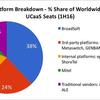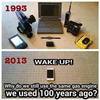"On February 18, 2010, a federal district court stepped in to fill the gap left by the FCC's silence on the issue of whether transmission of Voice over Internet Protocol ("VoIP")-originated calls is an information service exempt from access charges or a telecommunications service subject to access charges." [from Kelley-Drye]
I spoke with Kris Twomey last week about this judgment. In summary, the judgment of Civil Action No. 08-0397 is as follows: "If the call leaves the customer premise as VoIP and remains VoIP until it hits the tandem, then there are not any LD or toll access charges. VoIP is an Information Service according to the FCC."
Take a look at WC Docket No. 02-361, the decision was made in FCC 04-97 in the case of Petition for Declaratory Ruling that AT&T's Phone-to-Phone IP Telephony Services are Exempt from Access Charges.
In that ruling, the FCC said that the same phones as TDM were used; the same type of origination occurred; and most importantly, it was only IP in the middle. Calls originated over Group D trunks. The ruling was significant because of its Title I and II pronounements.
"The Commission created a distinction between basic services and enhanced services. A basic service is transmission capacity for the movement of information without net change in form or content. By contrast, an enhanced service contains a basic service component but also involves some degree of data processing that changes the form or content of the transmitted information. Therefore, the Commission found that, generally, services that result in a protocol conversion are enhanced services, while services that result in no net protocol conversion to the end user are basic services.... The Commission concluded that enhanced services constitute th electronic transmission of writing, signs, signals, pictures, etc., over the interstate telecommunications network and therefore are subject to the Commission's jurisdiction... The Commission declined to treat providers of enhanced services as common carriers subject to regulation under Title II of the Communications Act of 1934, as amended. The Commission exercised its Title I jurisdiction to impose conditions on both telephone carriers' entry into the enhanced services market and their provision of basic service to enhanced service providers."
"Specifically with regard to interstate access charges, the Commission stated, "to the extent we conclude that certain forms of phone-to-phone IP telephony service are 'telecommunications services,' and to the extent the providers of those services obtain the same circuit-switched access as obtained by other interexchange carriers, and therefore impose the same burdens on the local exchange as do other interexchange carriers, we may find it reasonable that they pay similar access charges." Hence, AT&T lost in 2004.
Today, we see that if it starts at the customer premise as IP and is converted to TDM at the Access Point (tandem or switch), then it is NOT subject to Access Charges as it is an Information Service, according to this ruling. [The PDF of the judgment is here]
Title II, Twomey notes, is where switched access comes from, so if the carrier is an information service provider, only Title I applies.
"It was recognized by both CommPartners and PAETEC that calls begun and transferred in TDM format are subject to access charges." What's funny is that Paetec, VZ, AT&T and other types of phone companies have a side of the house that is supplying SIP services, usually as SIP Trunks, and another side that is selling TDM. (For example, VZB versus VZT).
Obviously, Paetec is appealing this ruling -- and has the eyes of every LD carrier (Qwest, GC, L3, AT&T, VZ) as well as any wholesale carrier to the ITSP market are watching closely. The FCC has its hands full, but ruling on Inter-Carrier Compensation should be the very next priority after this silly National Broadband Plan ;)
An article at DWT gives more background on this case.












